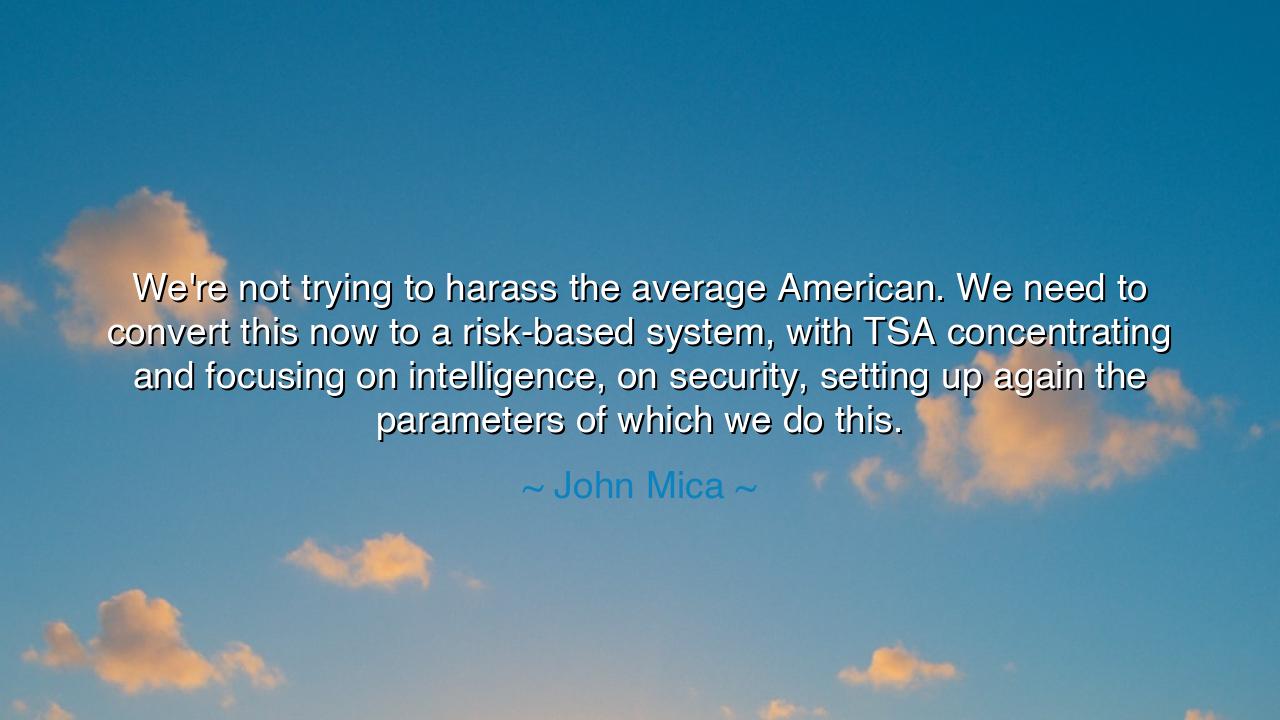
We're not trying to harass the average American. We need to
We're not trying to harass the average American. We need to convert this now to a risk-based system, with TSA concentrating and focusing on intelligence, on security, setting up again the parameters of which we do this.






“We’re not trying to harass the average American. We need to convert this now to a risk-based system, with TSA concentrating and focusing on intelligence, on security, setting up again the parameters of which we do this.” Thus spoke John Mica, a statesman and guardian of his nation’s safety, in the years following the long shadow of fear that fell upon the world after the attacks of September 11, 2001. In this utterance, we hear not merely the language of policy, but the ancient struggle between freedom and vigilance, between the rights of the people and the duty to protect them. His words are a plea for balance — that wisdom should temper power, and that intelligence and reason should guide the instruments of security.
When John Mica, one of the architects of the Transportation Security Administration (TSA), spoke these words, he was addressing the evolving nature of protection in an uncertain age. In the aftermath of terror and tragedy, governments across the world turned to systems of control, seeking to guard their citizens against unseen enemies. Airports became fortresses; borders grew wary. Yet with time, Mica saw a different truth emerging: that safety cannot be sustained by suspicion alone. He urged a transition — from the blind rigidity of universal scrutiny to the discernment of risk-based intelligence, where wisdom and knowledge replace fear and force.
The heart of Mica’s message lies in this — that security must never become tyranny. To protect the innocent by punishing all is to lose sight of the very freedom one seeks to defend. His words recall the wisdom of the ancients, who spoke often of justice as balance. The philosopher Aristotle wrote that virtue lies in the “golden mean,” the sacred midpoint between excess and deficiency. So too in governance: protection without restraint becomes oppression; liberty without vigilance becomes chaos. Mica’s call for a risk-based system is, therefore, a modern echo of that timeless principle — that reason must govern fear, and understanding must lead power.
We have seen this lesson written in history’s ink. In every age, nations under threat have faced the same temptation — to trade liberty for the illusion of absolute safety. The Romans, fearing spies and sedition, turned their republic into empire; the French Revolution, born of freedom, birthed terror through paranoia. Yet the greatest societies endured when they learned to temper strength with intelligence. During the Second World War, the Allies triumphed not by brute force alone, but by the brilliance of intelligence and strategy — the codebreakers of Bletchley Park, the analysts who foresaw enemy moves, the quiet heroes whose minds were sharper than any blade. Mica’s words, though born in a modern world of airports and data, carry this same truth: that the highest form of defense is not aggression, but understanding.
In speaking of the average American, Mica reminds us that governments exist to serve the people, not to rule them. When he says, “We’re not trying to harass,” he speaks against the spirit of bureaucracy that forgets its humanity. For every citizen detained unjustly, every traveler treated with suspicion, a thread of trust is lost — and trust is the foundation upon which true security rests. A nation that sees its own people as threats cannot be at peace. Mica calls for a restoration of parameters, of reasoned boundaries, where the rights of the people are honored even as their safety is ensured.
His plea, therefore, is both political and moral. To build a risk-based system is not merely to refine technology or data; it is to refine our wisdom — to discern between the guilty and the innocent, the shadow and the light. It is a call to use intelligence not as a weapon, but as a compass, to direct the guardians of the nation toward justice rather than oppression. For intelligence without ethics is cunning; security without conscience is control. Only when the two are joined does protection become sacred service.
So, my children of freedom and reason, let the words of John Mica guide you: safeguard your world, but do not surrender your humanity in doing so. Let your vigilance be wise, your protection compassionate, your intelligence humane. Build systems that defend without dividing, that shield without suffocating. For the strength of a nation lies not in how tightly it guards its gates, but in how deeply it honors its people.
Remember this eternal truth: fear builds walls; wisdom builds bridges. The wise guardian knows that security and liberty are not enemies, but companions walking hand in hand. Let intelligence, guided by conscience, lead you — for in that union lies the true peace of nations and the enduring dignity of mankind.






AAdministratorAdministrator
Welcome, honored guests. Please leave a comment, we will respond soon